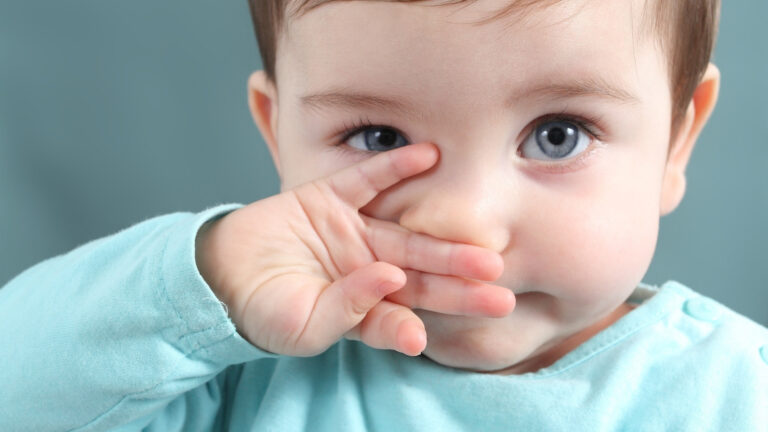Baby runny nose is not necessarily a health concern unless it lingers for so long or seem to be worsening with time. Depending on the underlying cause, it may also be associated with symptoms such as sneezing, coughing.
Common causes of baby runny nose cough
My baby has a runny nose and is coughing a bit. This is a common concern among parents.
Coughing is the body’s way of getting rid of perceived health threats be it pathogens like bacteria and viruses, allergens, or irritants such as cigarette smoke from the airways.
A runny nose on the other hand occurs when mucus membranes in the lining of the nasal passages produce excess mucus in response to factors such as allergens, viral or bacterial attacks, dry air, and irritants.
Some of the common causes of baby runny nose that is accompanied by cough are:
1. Common cold
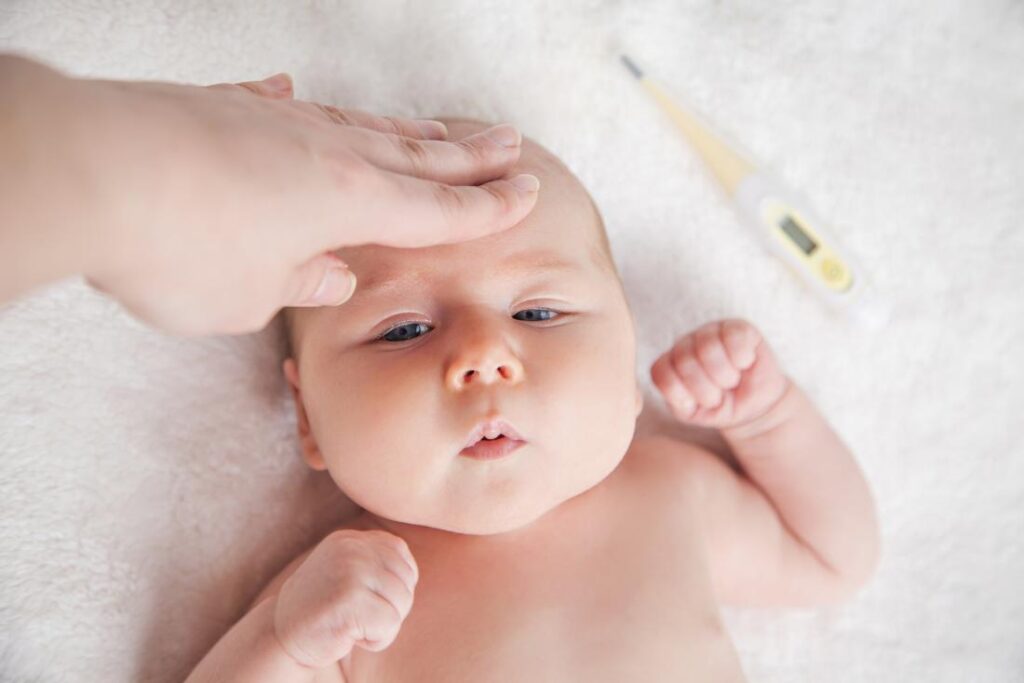
Respiratory tract viral infection, particularly common cold, is the most common cause of runny nose and cough in babies.
Babies tend to get common cold more frequently because their immune system is still developing and has not yet developed resistance to the more than 200 virus species responsible for common cold.
2. Nasal irritation
Any substances that irritate the nasal airways of a baby (irritants) can as well lead to an increase in mucus secretion as the body attempts to flush out these irritants.
3. Enlarged adenoids
According to Dr. Christopher Chang, an otolaryngologist (ear, nose and throat specialist) based in Warrenton, Virginia.
Watch out for signs and symptoms of more serious medical conditions, especially influenza, which include diarrhea, very high fever (more than 100.4 degrees Fahrenheit), lethargy, inability to feed, and vomiting.
Baby sneezing and runny nose
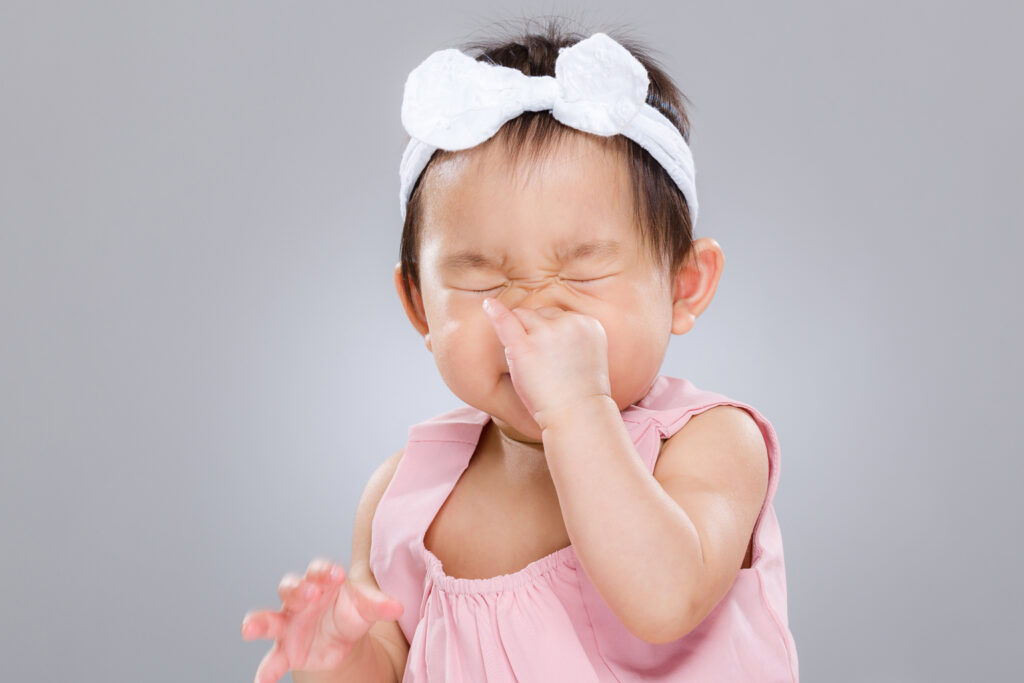
Sneezing helps to expel potentially damaging substances and microorganisms from the nasal airways before they cause any (or further) harm.
The involuntary expulsion of air is triggered by the presence of infections (viruses and bacteria and rarely fungi), allergens, and irritants such as paint fumes, string scents etc.
Common colds and allergies are the two most common causes of baby sneezing and runny nose.
Allergies are triggered when babies get exposed to allergens such as pollen, animal dander, and dust mites among others. When babies with sensitized immune system get exposed to such substances, an antibody called immunoglobin E is produced.
This then leads to a series of reactions that culminate in production of histamine. Histamine triggers higher production of mucus in the nasal cavities and may as well lead to inflammation of nasal tissues leading to congestion.
Common cold on the other hand is caused by infection by one or more of the more than 200 viruses known to cause it. Babies get an average of 10 to 12 colds every year owing to their less developed immune system.
To distinguish between these two main causes of runny nose and sneezing in babies, you need to pay close attention to other accompanying symptoms.
To start with, common cold mucus is usually clear at the onset but often turns green or yellow in later stages (usually around day 10). Other symptoms of common cold that you may observe in babies include mild fever (not more than 100.4 degrees Fahrenheit according to the Baby Center), nasal congestion, watery eyes, and swollen lymph nodes in the throat area.
Allergies are on the other hand associated with nasal congestion, red itchy eyes, and watery eye discharge in addition to runny nose and sneezing.
Baby constant runny nose
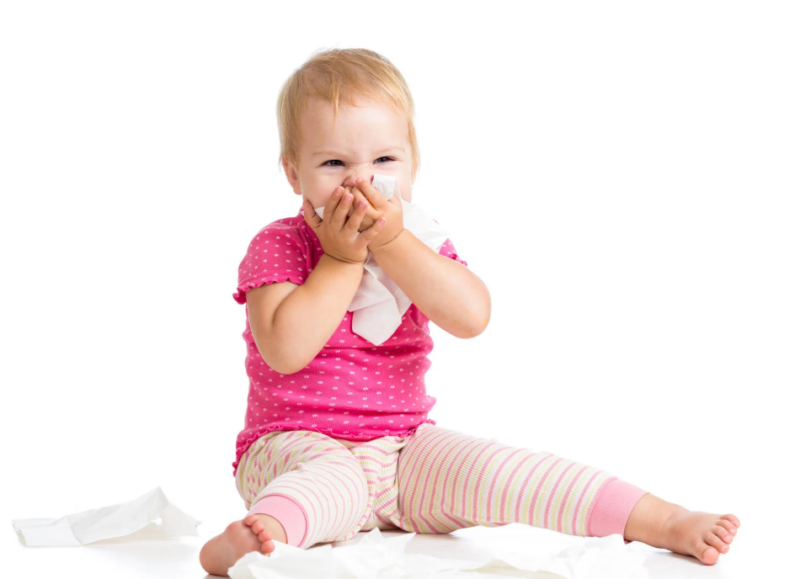
Babies tend to get common cold very often and as Jennifer Shu says, common cold bouts can happen so back to back that it seems like your baby has constant runny nose. Other than common cold, allergies can also cause constant runny nose in babies. The same is true of environmental irritants such as cigarette smoke, perfumes, and chemical fumes.
Baby runny nose no fever
Mild fever is a common symptom of common cold. As the Baby Centre website says, you can expect to record a fever of up to 100.4°F when your child is suffering from a cold. But what about a runny nose that is not accompanied by fever?
Well that may be an indication of dry air in your house which makes your baby’s nose to increase mucus secretion to moisten the nasal cavity and thus the air that enters the air passageways. Running a humidifier may help.
For newborn babies, runny nose (or nasal congestion) is a common phenomenon. It simply means that the gunk in her respiratory system is moving out. You should however seek medical attention if symptoms such as cough appear.
Spicy foods may as well be to blame for runny nose in babies that has no fever or any other symptom.
7-month-old baby runny nose
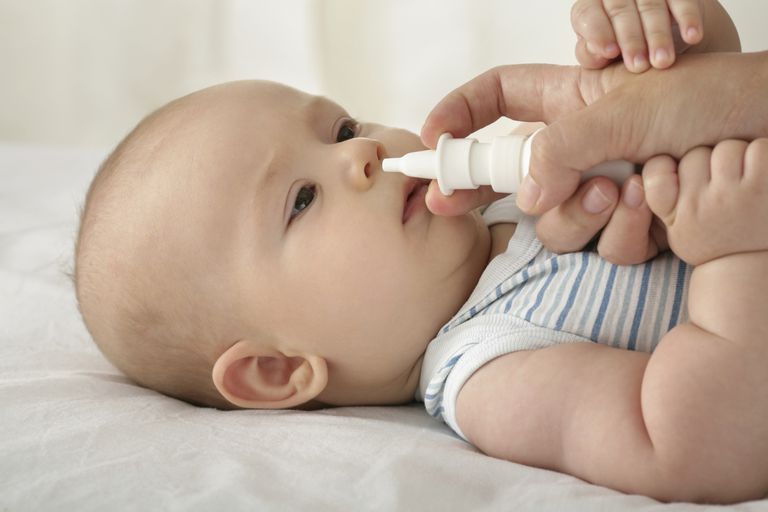
“My 7 month old has a runny nose. What should I give to her and what symptoms would signal that it is time to schedule an appointment with my pediatrician?”
That is a question that someone by the name Angie asked the other day. At 7 months of age, a baby is still developing her immunity and resistance to common cold viruses.
Common cold is thus one of the most likely causes but allergies, dry air, and environmental irritants such as smoke and paint fumes could as well be the underlying cause.
Your best bet would be to rinse your baby’s nose with a saline solution as described later on in this article and increasing moisture in your bedroom. Identifying and eliminating any potential allergens may also help.
Can teething cause a runny nose? Do babies have running noses when teething
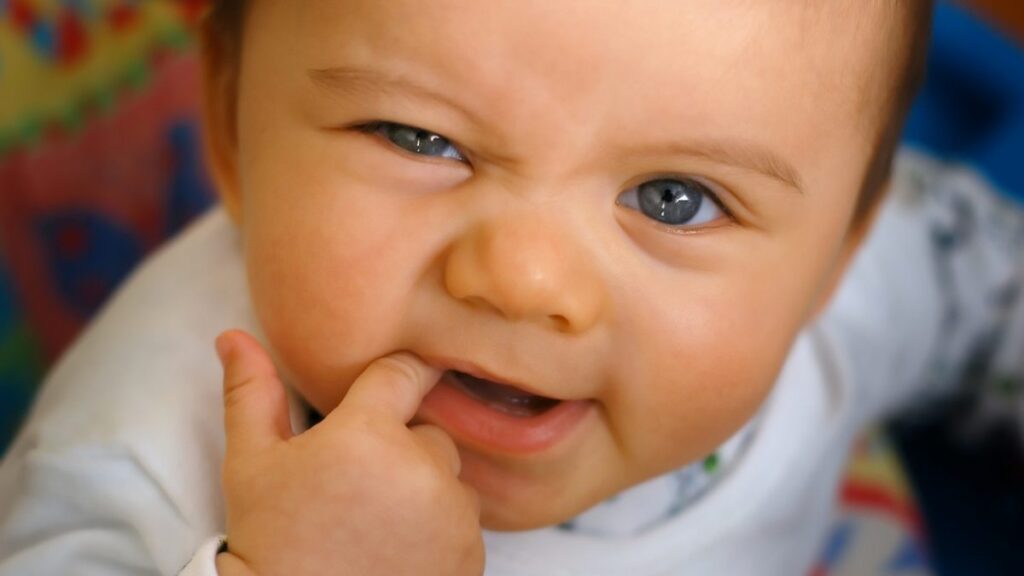
The question, “Can teething cause a runny nose?” and “Does babies have running noses when teething? Are often asked by first time moms.
The link between teething and baby runny nose makes for a debatable topic. Some parents and doctors have reported having their little ones, and patients, get a runny nose during the teething stage. Based on this, proponents of this argument hold the opinion that teething causes slight runny nose that is often accompanied by a cough.
Opponent of this argument however hold the opinion that other medical conditions the likes of common cold are usually to blame for such nasal discharge.
Baby runny nose is on a good note, however, not a medical concern in most cases and clears away in just a matter of days or weeks. You should only get concerned if the symptoms seems severe, particularly runny nose, nasal congestion, or cough. This may signal a more serious problem.
Rachel, Berger, MD, associate professor of pediatrics at Children’s Hospital, Pittsburgh also recommends seeking immediate medical attention if your baby’s temperature rise over 102°F.
For babies less than 3 months old, the Baby Center website recommends seeking urgent medical attention if their temperature is above 100.4°F.
Lastly, extreme fussiness, refusal to eat and drink, diarrhea, and vomiting should as well get you concerned.
How to treat baby runny nose – treatment, relief, how to stop, clear
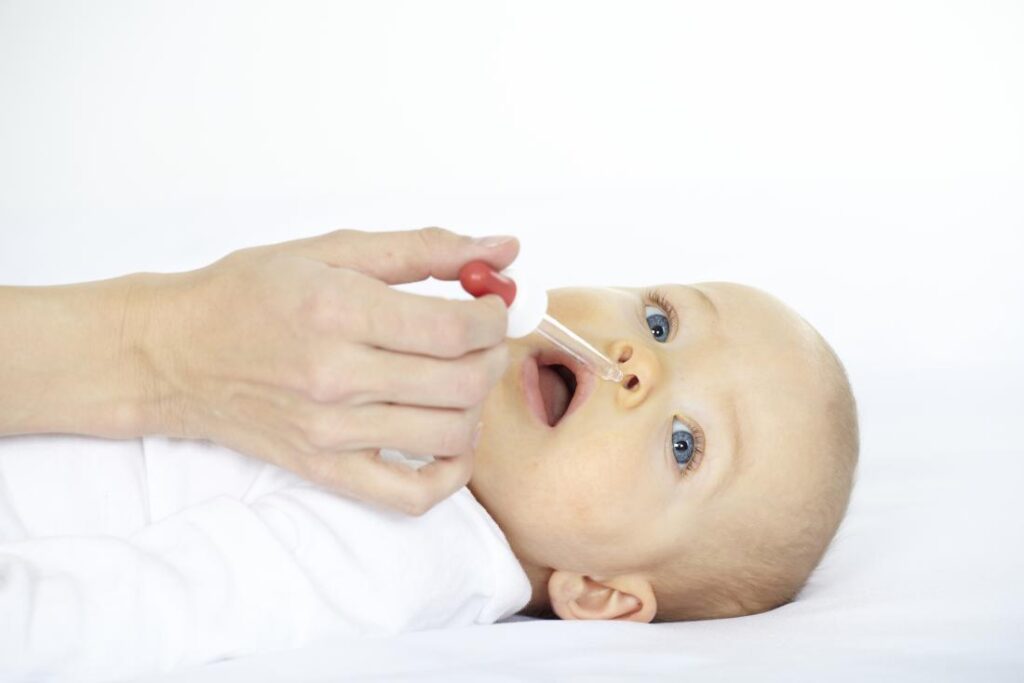
Runny nose in babies usually clears without treatment but several homecare relief measures can help to ease the symptoms. Here is how to stop baby runny nose at home, so to speak:
1. Give your baby plenty of fluids
Encourage your baby to breastfeed (or give baby formula) and take lots of fluids. This helps to keep the baby hydrated which in turn helps to promote draining of nasal secretions and soothing of the nasal cavities.
Electrolyte solutions such as Pedialyte may also help in hydration of babies who don’t seem to be drinking that well as Vincent Iannelli, M.D. suggests in an article published on About.com.
2. Avoid exposure to allergens and irritants
Try to eliminate any potential allergy triggers (allergens) and irritants from your home. Pet dander and dust mite are common allergens. Common irritants on the other hand include cigarette smoke, paints, chemical fumes, and dust.
Run a humidifier: Exposure to dry air irritates the nasal lining and makes the nasal cavity lining to increase its mucus secretions as a way to combat the dryness. Running a humidifier or cool mist vaporizer in your baby’s bedroom can help to moisten the air and reduce this effect while thinning out mucus to allow easy draining of the mucus.
3. Saline rinse followed by suction
Prepare a saline solution by mixing ¼ tsp. table salt with 1cup of warm water and then place a few drops into your baby’s nostrils while tipping her head backwards. Follow it up by sucking the mucus in her nostrils out with a nasal aspirator or bulb syringe.
Alternatively, you can get nasal saline drops from your local drugstore.
Baby runny nose medicine
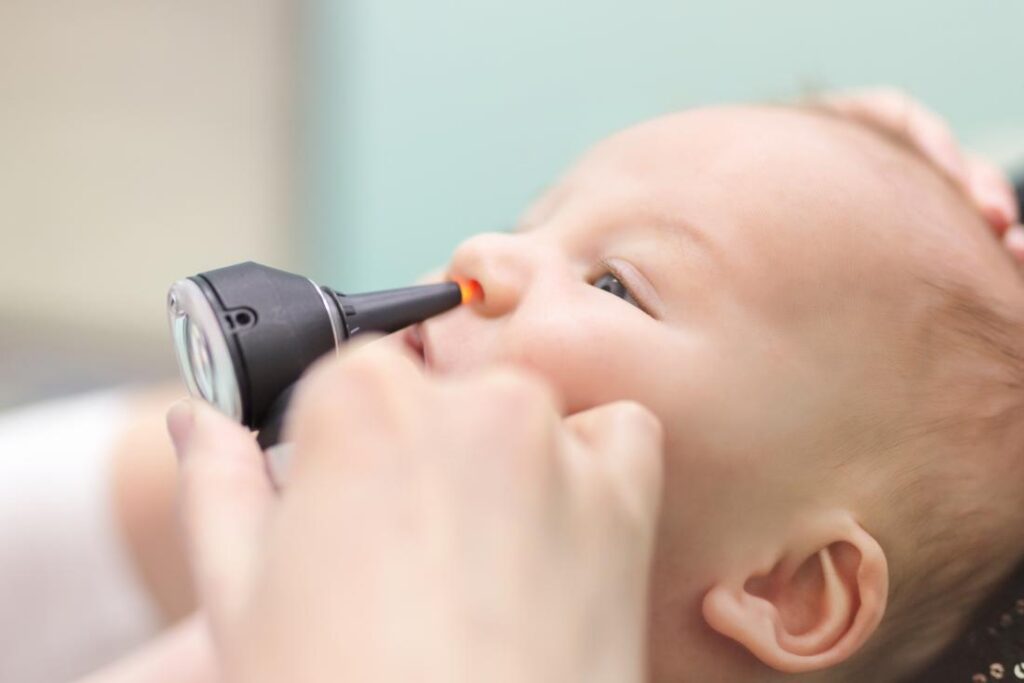
Over the counter baby runny nose medicine (cough and cold medicines to be more precise) have fallen out of favor from most stakeholders in the medical field. In fact most experts recommend staying away from them all together.
The American Academy of Pediatrics for example says that over-the-counter cough and cold medicines are not effective in children aged below 6 years and can as a matter of fact cause serious side effects. These medications don’t shorten the common cold course or protect them from secondary complications such as ear infection.
A baby with runny nose that causes high fever may however benefit from taking kids acetaminophen (kids Tylenol) or ibuprofen. Baby paracetamol is also a viable option if it is available in your country.
Aspirin is however not recommended for babies since it heightens their risk of developing Reye’s syndrome, a rare but often fatal medical condition that cause the liver and brain to swell.
Natural home remedies for runny nose in babies or what to do at home

In as far as what to do for runny nose in babies, here are several home remedies that you may want to consider:
Honey and lemon: For coughs, the National Health Service website suggests using a home remedy that contains lemon juice and honey.
Tea: For babies who are at least six months, Baby Center website suggests using a weak chamomile tea solution to relieve their symptoms.
Eucalyptus oil: According to, adding several drops of eucalyptus oil to bath water or to a vaporizer can help to reduce runny nose and associated symptoms in babies. Menthol and pine oil also work fine.

